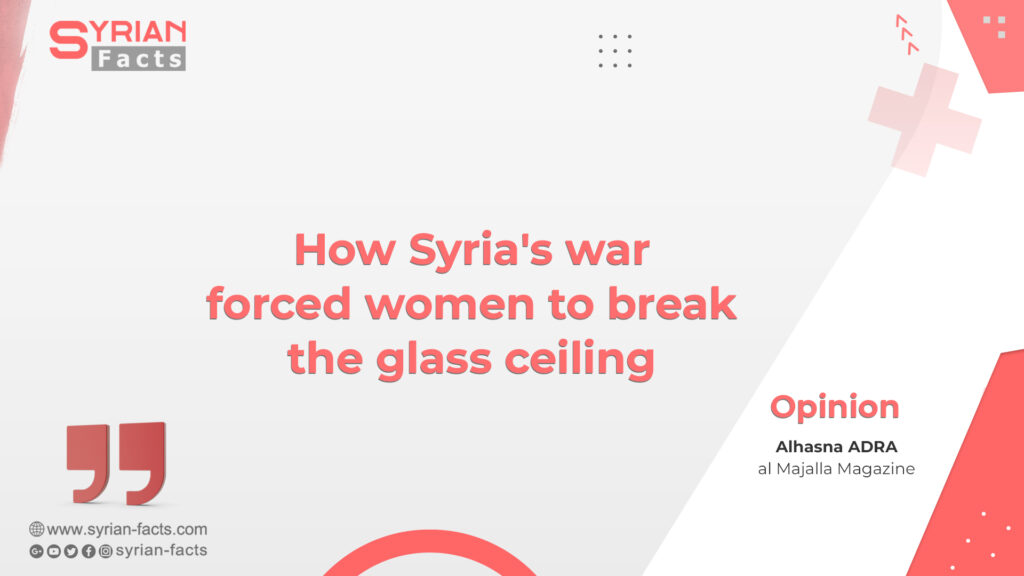Damascus: Catastrophic as it has been, the Syrian war marked a milestone in the lives of many Syrian women. It advanced their journeys toward self-realisation after being marginalised and controlled by men for so long.
The war shook the belief that women could only be fulfilled through traditional roles, such as being caregivers to their husbands and children.
However, this change was not a result of feminist advocacy, or a strong desire to alleviate the oppression of women and recognise their independence. After the death, disability, or displacement of their husbands, fathers, and brothers, many women became the sole breadwinners for their families overnight.
For them, working was the only option to combat hunger and poverty. As a result, the role of male guardianship declined in Syria over the last decade.
Destination Damascus
At the onset of the war, Damascus became the go-to city for those looking for employment. Many fled their small, coastal villages – or cities in the eastern and central regions – in search of better opportunities.
The capital, seen as the safest city in Syria, already enjoyed a reputation for being the place where dreams come true for young jobseekers coming from both urban and rural areas.
With the war, however, there was a shift; women began to take on demanding jobs that had previously been dominated by men, abandoning traditional gender roles.
Fields such as construction, taxi driving, car repair, sanitary and electrical installations, and civil service became more accommodating, welcoming some 2,000 women.
In parallel, the more traditional roles of women in medicine and engineering declined.
‘I pay no mind to whispers’
At a restaurant in Bab Sharqi, the liveliest Damascus neighbourhood at night, Jilnar leans on a table after her long day shift at a government institution as she prepares to begin her evening shift waiting tables.
For seven years now, the twentysomething has been working at the food joint from nine in the evening until midnight, when she finally returns home, exhausted.
She tells Al Majalla: “At first, I struggled to find a job with a decent salary and reluctantly accepted this one. But I’ve come to genuinely enjoy this work. Tiring as it may be, the atmosphere is always vibrant and thrilling. Plus, I receive generous tips from customers because I’m a young woman, and my employer treats me with respect and kindness.”
Jilnar says people look at her differently now. At first, her working there was frowned upon, but that’s no longer the case.
“My morning wage covers my rent,” she says, “and my earnings from the restaurant and the tips allow me to fulfil my other needs and support my family. I pay no mind to people’s whispers. They won’t put food on the table. My work can – and does.”
Near Al-Mouwasat Hospital, Umm Muhammad is parking a cart filled with colourful children’s sweets. Her hands are cracked from dragging the load for half an hour.
“I have been working at the stall for almost three years,” she says. “My son disappeared during the war and there has been no news of him at all, and my husband died of a heart attack. I am the only breadwinner left for my two daughters, who work and study at the university.”
Umm Muhammad suffers from spinal disc problems due to standing for long hours. Yet following the doctor’s advice to rest would mean leaving her daughters without any income.
Life lessons
Meanwhile, at the age of 24, Jihan learned to sharpen a butcher’s knife and cut fresh carcasses. After her only brother passed away, she stepped in to fill his role at their father’s butchery.
“My brother was the only one who assisted my father. The other males in the family have their own responsibilities, so there was no one left but me,” she says.
“I proposed to my father to help him out at the butchery so we can keep the business running.”
When she’s not assisting her father in the family business, Jihan gives private English lessons.
The young woman says she has no problem dealing with the stench of blood and meat, which she has been accustomed to since childhood.
Despite disapproving looks and criticism, she continues to work, even during her menstrual cycle. “I’ve faced criticism for working with meat during my period, but I don’t let it bother me. I just focus on staying comfortable.”
Meanwhile, 20-year-old Mezkin works as a delivery driver for multiple agencies using an electric bike, taking great care to deliver customers’ orders safely.
“I live with my family in Damascus. The idea came to me when my father decided to sell my brother’s bike after he went abroad. I was looking for a job at the time, and I thought to myself: why not use it for delivery?” she says.
Mezkin had learned to ride a bike from her brother. She was drawn to the opportunity to use her sharp skills, as well as the flexible working hours.
“I replied to a Facebook post by a clothing store that needed a delivery service. I charge about 10,000 liras (~USD 0.76) per order, sometimes more,” she says.
Empowerment and liberation
Stories like Mezkin’s highlight how much gender roles in Syria have changed, perhaps even reversing completely.
According to official statistics released in 2023 by the Syrian Ministry of Social Affairs and Labour, the rate of women’s employment and participation in the labour market surpassed men’s by a ratio of seven to one.
With the absence of men during the war – whether due to being on the frontlines or through forced disappearances, compulsory military service and other combat operations – male dominance became less prominent in society.
A deeply entrenched patriarchy declined. Women were freed from economic control and forced marriages, as well as male guardianship during travel.
The latter, particularly, was a lifesaver for women, who had to endure the hardship of travelling illegally to European countries as refugees. They were now able to apply for family reunification and secure better opportunities for their family members – a role typically entrusted to men.
In the Syrian countryside and on the outskirts of Damascus, women have also been empowered and liberated from patriarchal and religious authority.
Many chose to remove their hijab to express their freedom from religious control, particularly after moving from rural areas to cosmopolitan cities with diverse faiths and sectarian populations.
Effects of war
Wars and conflicts often alter social, economic, and gender roles. While this change can result from a deliberate and organised collective effort, it can also be forced upon a population.
In a discussion with Al Majalla about the adverse impact of the war on Syrian society, sociologist Subait Suleiman emphasises the war’s impact on women.
Working in professions such as butchery, driving, and portering has pushed them into their newfound roles as breadwinners and providers, in addition to their traditional responsibilities, including household tasks and caring for family members.
This has placed them under immense physical, psychological, and economic strain.
Social media sphere
Social media also played a role in paving the way for women to enter the workforce, especially for the war generation.
Many Syrian women took to these platforms to express their views on gender, justice, equality, and civil society. Since 2011, they have been reshaping the collective perception of women, breaking stereotypes and traditions, and even touching upon taboos.
In recent years, the emergence of new concepts such as “fashionistas” and “bloggers” further transformed the way women could make a living.
Once upon a time, the mere idea of working in a government institution surrounded by a dozen men seemed impossible. Now, women are making a living through content that is watched by millions.
Syrian feminism revived
Feminist writer and physician Maya Al-Rahbi says Syrian feminism has grown substantially since 2011.
The movement witnessed a revival after a period of stagnation in the sixties and a tentative resurgence in 2000; during the latter, unauthorised feminist gatherings, despite their small scale and security limitations, courageously challenged the Personal Status Law.
Al-Rahbi tells Al Majalla that the Syrian feminist movement abroad helped to educate women about their rights and empower them economically.
The movement also became licensed and more organised, with nearly 165 initiatives and organisations established in the country.
Yet, while Syrian feminism made significant strides toward establishing a clear structure and systematic goals over the past decade, it still operates within a turbulent and uncertain environment, which poses a threat to its sustainability and progress.
al Majalla Magazine





Be the first to write a comment.